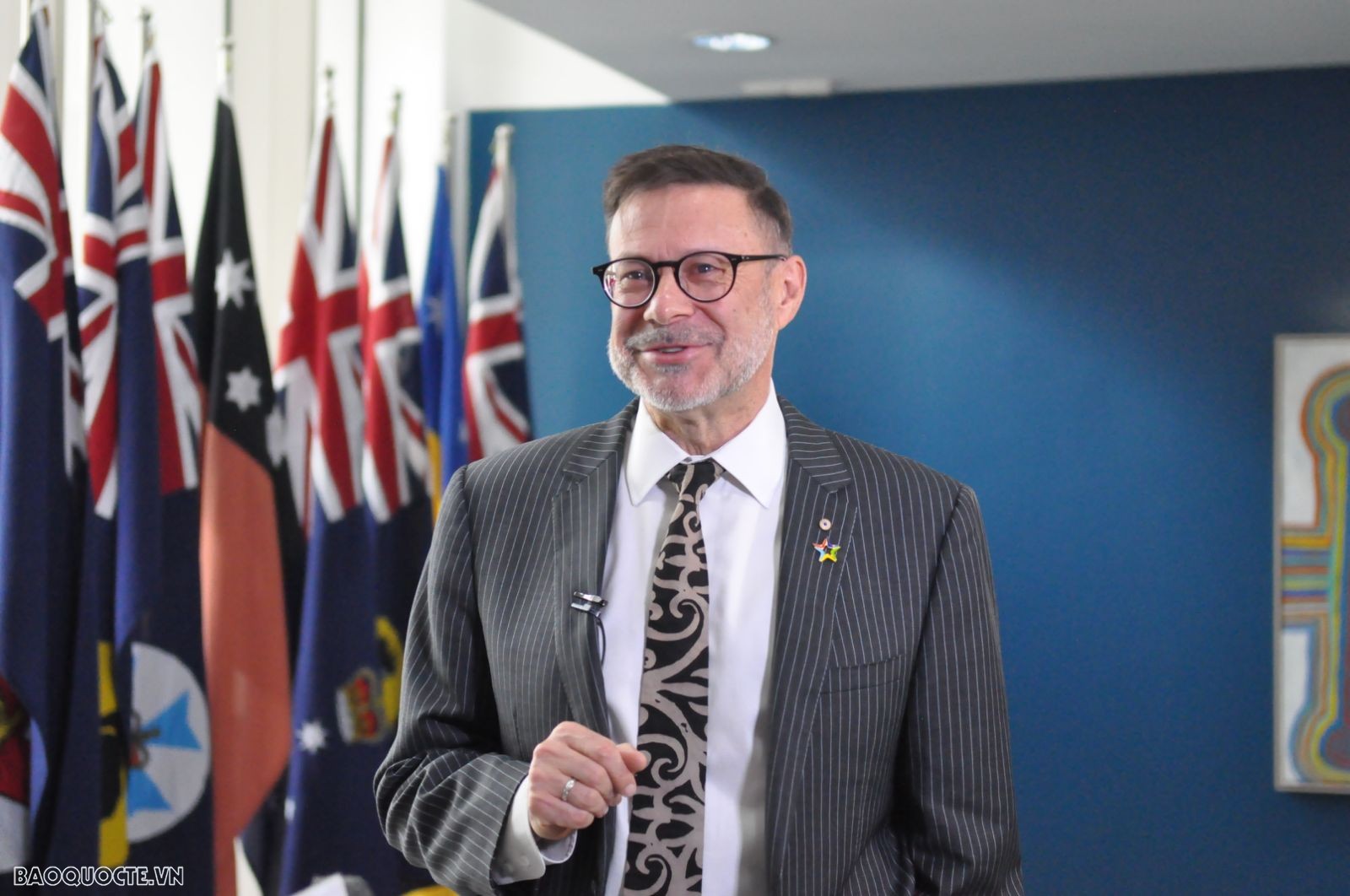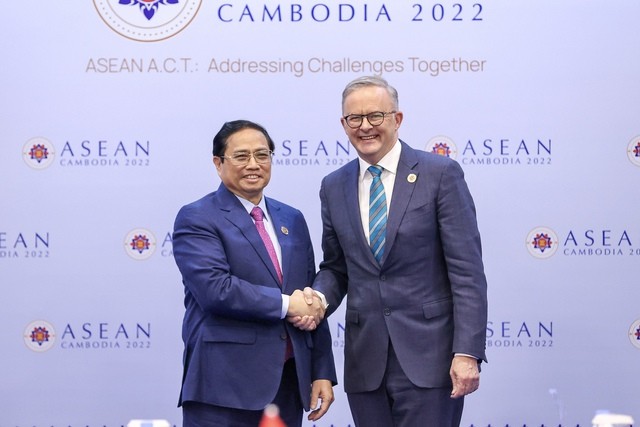
Ambassador Goledzinowski: Vietnam is at the heart of Australia ’s ASEAN diplomacy
Latest
 |
| Australian Ambassador to Vietnam Andrew Goledzinowski. (Photo: Minh Quan) |
On the invitation of Prime Minister Pham Minh Chinh, Australian Prime Minister Anthony Albanese is going to pay an official visit to Viet Nam on June 3rd - 4th. Prior to the visit, Australian Ambassador Andrew Goledzinowski have addressed the Vietnamese media on the significance and agenda of this special event.
What is the purpose and significance of the Australian Prime Minister, Anthony Albanese’s upcoming visit to Vietnam, in the context of the 50th anniversary of Vietnam-Australia relations (1973-2023)?
First of all, it is lovely to have the chance to speak to the media about this important anniversary and this important visit that is coming up tomorrow.
Australia was the first country after the conclusion of the Paris Peace Accords to establish diplomatic relations of Vietnam. So much has happened over the last 50 years. I think that this visit is important: It is not just an opportunity to look back on the last 50 years and look forward to the next 50 years of cooperation, but it is also the first visit by Prime Minister Anthony Albanese to Vietnam. His government was elected only just one year ago with a strong commitment to closer engagement in Southeast Asia, particularly Vietnam.
Therefore, I think we will be looking at all the areas where we are working together. I am sure the two leaders also be discussing the opportunity to upgrade our relationship to the next level.
How will the visit contribute the development of the relationship, specifically, the process of upgrading the two countries' relations to a comprehensive strategic partnership as set out by the leaders?
Australia and Vietnam are currently strategic partners. That strategic partnership covers three areas. The first is economic cooperation, including trade and investment. The second one is knowledge and innovation, including universities and education. The third one is defense and strategic cooperation. I think that the two leaders will meet and talk about all these areas and how we can further develop cooperation in each of those.
In addition, from what I have heard, the Vietnamese side would like to add a fourth pillar to the relationship when we move to a comprehensive strategic partnership. That fourth pillar might be climate change and energy transition cooperation. That is an important opportunity as well. Therefore, I expect that all of these would appear during discussions with Vietnam's four top leaders.
 |
| Prime Minister Pham Minh Chinh met his Australian counterpart Anthony Albanese at the 42nd ASEAN Summit and related meetings in Phnom Penh, Cambodia on November 2022. (Photo: VGP) |
Vietnam is an increasingly important economic and strategic partner for Australia in Southeast Asia, an area of focus of the Albanese government. What direction will be deployed in the future to strengthen the relationship between the two countries?
Vietnam is an important economic partner for Australia. This year, you became the 15th largest country in the world and the fastest growing economy in Asia.
Everybody is interested in Vietnam. Our economic relations have grown quite quickly. In the last few years, Australia has risen to be Viet Nam's seventh biggest trading partner. We were traditionally one of the first investors in Vietnam. The first foreign bank, the first international law firm, the first international university in Vietnam all came from Australia. It was Australia that helped constructing the North-South electricity high tension connection The first satellite links for telephone calls and the first undersea cables were also supported by Australians.
As Vietnam continues to progress and goes up the value curve in terms of high-tech engineering and development, that is where Australia needs. That is where our partnership can grow even more.
One particular area that I would like to see further development is education. During a recent discussion with His Excellency, Minister of Education Nguyen Kim Son, I mentioned that over the last 23 years, only one foreign university has opened a branch campus in Viet Nam. That was Australian’s RMIT.
We should be doing better than that. Therefore, I am hoping to work with the country’s Ministry of Education to develop a framework that will allow other international universities to establish in Vietnam, not just Australian universities, but particularly Australian universities.
From your point of view, why is the highlight in the Vietnam and Australia defense cooperation?
Well, that is very important. Australia, as you know, is a U.S. treaty ally. Vietnam is a non-aligned country. Nevertheless, there is much scope for cooperation, and indeed we do cooperate in a number of areas.
Famously, we work together on peacekeeping. In a few weeks, together with your President, I will say farewell to the next rotation of Vietnamese peacekeepers to Africa. Australia is very much involved in that effort. Our two armies do skills training in a number of areas.
Importantly, we do discuss a lot on issues such as the South China Sea. We have strong views, as does Vietnam, on issues of sovereignty, territorial integrity, the rule of law. Both countries strongly support the United Nations’ Convention on the Law of the Sea.
This evening, my Prime Minister will be in Singapore. He will deliver the keynote speech at the Shangri-La Dialogue, which is the most important strategic conference in Asia. I think that the Vietnamese government will be listening very carefully to what he has to say. I expect that there will be strong agreement on many of his points because as I say, we share strong views about those issues.
| I am hoping to work with the country’s Ministry of Education to develop a framework that will allow other international universities to establish their campuses in Vietnam, not just Australian universities, but particularly Australian universities. |
You have just mentioned cooperation in climate change and energy conditioning. How can we expect further cooperation from those areas?
Both Vietnam and Australia shares some similarities. We have different geographies, yet we are both much dependent on carbon at the moment, carbon sources of energy. At the same time, we have both made ambitious commitments to decarbonize our economies. Yet, the process will be very important, because we want to make sure that our economies continue to grow through this period.
Australia is putting a lot of efforts in this area. At the moment, we are investing in wind power in Viet Nam. In addition, we are working with VINFAST to help them to distribute their charging station network around the country. Specifically, Australia is a co-investor with Vingroup in promoting those green buses that you are seeing in Hanoi. We are doing a lot, but I believe that we can do much more.
Interestingly, I predict that there will be some important announcements from Prime Minister Albanese's upcoming visit to Vietnam, precisely on that area.
What is your opmion on Vietnam’s bamboo diplomacy?
Vietnam has a lot of good diplomats. I think it is fair to say that Vietnam punches above its weight and we expect you to do even more in the future.
For us, the Association of Southeast Asian Nations (ASEAN) is at the heart of our regional diplomacy and Vietnam is at the heart of our ASEAN diplomacy. We look forward to supporting your bamboo diplomacy as it continues succeed globally.









